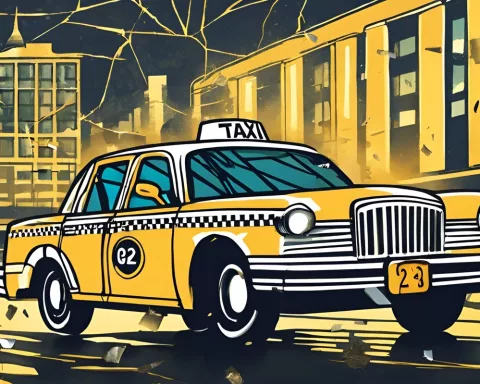The R408 million given to South Africa’s taxi industry has sparked a heated debate. Many people, including the group Build One South Africa, are worried about how the government is spending money, especially during tough economic times. Critics point out that while the taxi industry is important for transport, it hasn’t contributed much to taxes. They demand clear answers on how this money will be used and who will benefit, emphasizing the need for responsible and transparent governance. As this discussion unfolds, it highlights the ongoing struggles for fairness and accountability in South Africa.
What is the controversy surrounding the R408 million allocation to South Africa’s taxi industry?
The R408 million allocation to South Africa’s taxi industry has ignited debate due to concerns over government spending priorities amid economic challenges. Critics, including Build One South Africa, question the accountability, transparency, and effectiveness of this financial intervention, emphasizing the need for responsible governance.
The recent government decision to allocate R408 million as a ‘once-off gratuity’ to South Africa’s taxi industry has sparked a significant debate. This financial decision, revealed by Finance Minister Enoch Godongwana in the 2025/26 national budget, has drawn intense scrutiny from many political and public sectors. Among the most vocal critics is Build One South Africa (BOSA), which has expressed concerns that echo a broader unease about the government’s spending priorities amid persistent economic challenges.
The Taxi Industry: A Cornerstone With Complex Dynamics
South Africa’s taxi industry serves as a vital pillar of public transport, ferrying millions of commuters daily. This sector, while essential, has historically been mired in controversy, marked by intense competition, frequent conflicts, and a robust informal economy. Given its pivotal role, any financial intervention in this industry inevitably attracts both interest and skepticism. Roger Solomon, BOSA’s spokesperson, highlights this skepticism by questioning the wisdom of channeling such a large sum into a sector with a dubious tax contribution record. He points out that although the taxi industry operates on a multibillion-rand scale, its contribution to the national tax revenue is minimal, if not non-existent.
The allocation comes at a particularly critical time for South Africa, which is grappling with numerous economic issues. The country has seen increases in Value Added Tax (VAT), relentless hikes in fuel prices, and a general rise in the cost of living. Against this backdrop, Solomon’s critique underscores a perceived disparity and injustice in public spending. He articulates a sentiment widely shared by constituents: in a nation beset by high unemployment rates, economic stagnation, and underfunded essential services, the rationale behind prioritizing the taxi industry for such a generous allocation demands rigorous justification.
Demand for Transparency: A Broader Call for Accountable Governance
Solomon’s demand for transparency isn’t limited to the R408 million allocation alone. It reflects a broader call for accountable governance, a recurrent theme in South Africa’s recent political history. Post-apartheid South Africa has faced numerous challenges in ensuring that financial allocations reach the sectors most in need and maintaining rigorous oversight to prevent corruption and wasteful spending. BOSA’s insistence that Transport Minister Barbara Creecy provides a detailed explanation is rooted in this ongoing struggle for fiscal responsibility and transparent governance.
Historically, financial interventions in the taxi industry are not without precedent. In the early 2000s, the government initiated recapitalization programs aimed at modernizing the aging fleet of minibus taxis. However, these programs often fell short of their goals, plagued by mismanagement and inadequate implementation. The current allocation revives old concerns about the efficacy and oversight of such interventions.
Solomon’s insistence that taxpayers deserve clarity taps into a broader democratic ethos. The principle of “no taxation without representation” finds a modern echo in his argument. Citizens fund the state through taxes and, in return, expect that their money is used judiciously and transparently. The narrative of South Africa’s economic development has always intertwined with themes of equity and justice, especially in a nation still healing from the deep scars of apartheid.
Calls for Specific Accountability and Broader Implications
Solomon and BOSA’s call for transparency extends to specific demands: understanding the reasoning behind the R408 million gratuity, identifying the intended beneficiaries, and clarifying the criteria and process for its distribution. These questions are not mere bureaucratic formalities but essential to ensuring that the allocation serves its intended purpose without falling prey to misuse. They aim to dismantle any semblance of opaqueness that could shroud the allocation process, ensuring that every rand serves the public interest.
Beyond the immediate political and financial implications, this controversy illuminates the broader socio-economic dynamics in South Africa. The taxi industry, while a crucial component of public transport, also symbolizes the challenges of integrating informal sectors into the formal economy. The sector’s informal nature complicates efforts to regulate it and ensure its contribution to national revenue. Yet, its importance in providing affordable and accessible transportation cannot be overstated.
Furthermore, the allocation resonates with historical and artistic movements that underscore the importance of grassroots efforts and the voices of ordinary people. Much like the Black Consciousness Movement of the 1970s, which championed self-reliance and empowerment, today’s calls for transparency and accountability reflect a desire for a government that genuinely addresses the needs of its people. It serves as a reminder that economic policies and budget allocations are not just numbers on a spreadsheet; they directly impact people’s lives and livelihoods.
The Role of Civil Society and Political Organizations
The controversy also invites reflection on the role of civil society and political organizations in shaping public discourse. BOSA’s outspoken stance exemplifies the critical function of opposition parties and watchdogs in a healthy democracy. Their role in questioning and holding the government accountable ensures that public policies remain aligned with the populace’s needs.
In conclusion, while the R408 million allocation to South Africa’s taxi industry has stirred controversy, it also underscores essential themes of transparency, accountability, and equitable governance. It encourages a deeper examination of how financial decisions are made and the broader socio-economic impacts of such decisions. As South Africa continues to navigate its complex economic landscape, the calls for transparency and responsible governance remain as relevant as ever.
FAQ on the R408 Million Allocation to South Africa’s Taxi Industry
What is the controversy surrounding the R408 million allocation to South Africa’s taxi industry?
The R408 million allocation has sparked debate due to concerns over government spending priorities in light of ongoing economic challenges. Critics, including Build One South Africa, question the accountability, transparency, and effectiveness of this financial intervention, emphasizing the necessity for responsible governance during tough economic times.
Why is the taxi industry significant to South Africa?
The taxi industry is a vital pillar of public transport in South Africa, carrying millions of commuters daily. Despite its importance, the sector is marred by issues related to intense competition, conflicts, and a robust informal economy, which complicate its regulation and integration into the formal economy.
What are the main criticisms of the R408 million allocation?
Critics, notably from Build One South Africa, argue that the taxi industry has historically contributed little to national tax revenue. They express concern that allocating such a substantial sum to this sector, especially amid rising living costs and high unemployment rates, reflects poor government spending priorities. There is a demand for clarity regarding how this money will be utilized and who will benefit from it.
What specific accountability measures are being called for by critics?
Critics are demanding transparency regarding the allocation process, including:
1. The rationale behind the R408 million gratuity.
2. Identification of intended beneficiaries.
3. Clarification of the criteria and process for distribution.
These points are crucial to ensuring that the funds are used effectively and do not fall prey to mismanagement.
How does this controversy reflect broader issues in South African governance?
The debate over the R408 million allocation highlights ongoing struggles for fairness, accountability, and transparent governance in South Africa. It reflects a broader call for fiscal responsibility and oversight, especially in a country still grappling with the legacy of apartheid and economic inequality.
What is the role of civil society and political organizations in this context?
Civil society and political organizations, such as Build One South Africa, play a critical role in shaping public discourse and holding the government accountable. Their involvement ensures that public policies align with the needs of the populace, promoting greater transparency and responsible governance in South Africa.












